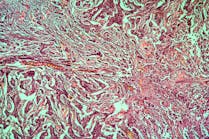Researchers at the UCLA Jonsson Comprehensive Cancer Center have found certain immune cells can still fight cancer even when the cancer cells lack an important protein that the immune system relies on to help track down cancer cells.
The team discovered the absence of the crucial protein B2M seems to activate an alternative immune response involving natural killer (NK) cells and CD4+ T cells in both animal studies and patient tumor biopsies, indicating a potential backup mechanism in the immune system to recognize and attack cancer cells.
Immunotherapies, such as immune checkpoint blockade, rely heavily on reactivating CD8+ T cells, which recognize tumor antigens through specific surface molecules on cancer cells. B2M proteins play a key role in this process to help CD8+ T cells identify the cancer cells. However, the researchers noticed that in cases where the B2M protein is missing or significantly reduced, some patients’ cancers can still respond positively to immune checkpoint blockade.
To understand this better, the researchers edited the genes of mice with melanoma using CRISPR/CAS9 to make them lose the B2M protein, similar to how some cancer cells lose it. They discovered that in these mice, immune cells —specifically CD4+ T cells and NK cells — could still fight the cancer when given the immunotherapy treatment.
Similarly, in a large cohort of patients with melanoma, they found that tumors lacking proper B2M often displayed an increased presence of activated NK cells, suggesting that these cells might play a vital role in combating cancer when the usual recognition markers are missing.
The study shows that the immune system can still fight certain cancers, like melanoma, even when they lack B2M and thus, CD8+ T cells are rendered less efficient. Understanding these mechanisms could pave the way for the development of more effective combination cancer immunotherapy treatments.
The study was published in the journal Cancer Immunology Research.





